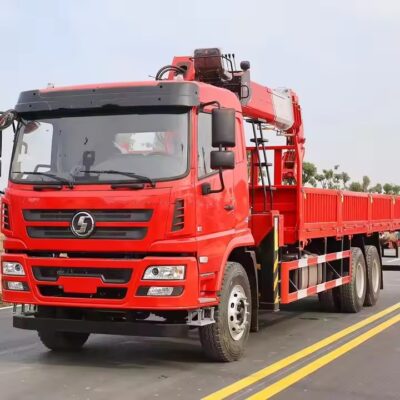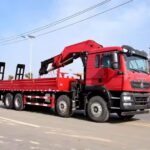トラック搭載クレーンs have emerged as a novel type of 特殊車両 model in recent years and have gradually supplanted truck cranes. Why is this the case? The answer lies in the fact that トラック搭載クレーンs serve a dual purpose – functioning both as cranes and as trucks – and come with relatively reasonable prices, thereby gaining wide acceptance among the masses. Just like any vehicle, there are certain aspects that demand attention to guarantee safe driving. Here are several key points to bear in mind during the driving and operation of トラック搭載クレーンs:

- Before setting off, it is highly advisable to determine the route in advance. The chosen road should ideally be relatively flat, and the operation site should also be selected to be as level as possible. This is because when the crane is in operation, it exerts substantial pressure on the ground. If the ground is level, the force application will be more uniform, significantly reducing the likelihood of the vehicle tipping over.

例えば, if the ground is uneven or has significant slopes, the force distribution becomes uneven. This can lead to one side of the vehicle bearing more weight than the other, increasing the risk of instability. A flat surface ensures that the pressure is evenly distributed across all wheels and supports, providing a more stable foundation for the crane’s operation.
- During the operation of the truck-mounted crane, the sling should remain vertical at all times and preferably not exceed the slewing radius of the crane. Failure to adhere to this can result in various undesirable consequences such as overloading, steel wire rope slippage, or even rope breakage, which can cause the crane to lose its stability. When lifting heavy objects, it is essential to set up a traction rope.

Let’s elaborate on this point. If the sling exceeds the slewing radius, the force vectors acting on the crane and the lifted object change, potentially causing an imbalance in forces. This imbalance can lead to excessive stress on certain components of the crane, increasing the risk of mechanical failure. The use of a traction rope provides an additional layer of control and stability, especially when handling large or irregularly shaped objects.
- When the truck-mounted crane is undertaking lifting operations, on one hand, the lifted object must be securely fastened. If the lifted object is not properly fixed, during the lifting process, there is a high probability that the center of gravity of the object will shift. This shift can result in torque imbalance, subsequently causing the center of gravity of the entire vehicle to change and increasing the risk of the vehicle tipping over. On the other hand, the extension, lifting, and slewing of the boom should be executed smoothly and steadily to avoid any swaying or oscillations in the air. 同時に, emergency braking or shock and vibration should be avoided to the greatest extent possible. Without reliable technical measures and approval from the relevant authorities, の トラック搭載クレーン is strictly prohibited from lifting with excessive loads. This is because such actions can accelerate the wear and tear of vehicle components and, in severe cases, lead to the vehicle tipping over.

例えば, if the lifted object is not adequately secured and its center of gravity shifts suddenly, it can cause the crane to tilt unexpectedly. This not only poses a threat to the safety of the operation but also potentially causes damage to the crane and the surrounding environment. The smooth and controlled movement of the boom is crucial to maintaining stability and preventing sudden jerks or movements that could upset the balance of the vehicle.
- The truck-mounted crane should also avoid full-load driving. In fact, this principle applies not only to トラック搭載クレーンs but to all other vehicles as well. Full-load driving is an inherently unsafe practice. When the vehicle is at full load or close to it, it is strictly prohibited to perform both lifting and slewing actions simultaneously. This combination is highly likely to induce shaking due to inertia. さらに, if the operation site at this time is uneven, it significantly increases the probability of a tip-over accident.

全体, the key consideration is centered around the stability of the center of gravity. When the center of gravity remains stable, the chances of the vehicle tipping over are significantly reduced. Maintaining a stable center of gravity requires careful attention to the weight and distribution of the lifted objects, the position and movement of the crane boom, and the condition of the operating surface.
結論は, を操作する トラック搭載クレーン safely demands meticulous planning, precise execution, and strict adherence to safety guidelines and procedures. By paying close attention to these details and taking necessary precautions, the risk of tip-over accidents can be minimized, ensuring the efficient and safe operation of the crane.









